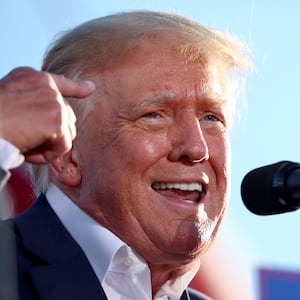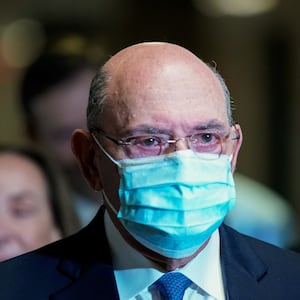The criminal trial of former President Donald Trump’s family company began on Monday with a tall task: Finding 18 fair and impartial jurors.
From the get-go, the task seems fraught with issues, as more than two dozen jurors privately met with the judge to share their conflicts and personal concerns. To ensure a wide enough pool of jury candidates, courtroom bailiffs dragged several extra pews into the room—just enough space for 134 prospective jurors to get sworn in.
And that’s just the first batch.
Justice Juan Merchan, a state court judge, warned a packed courtroom that the process could take a week or even two—further delaying a long-awaited trial that threatens to punish the ex-president’s pride and joy.
"You alone are the judges of the facts," Merchan told them, noting that "there are two defendants before you."
Two Trump Organization entities—a similarly named corporation and its sister payroll firm—are on trial for dodging taxes by rewarding its former chief financial officer with off-the-books perks.
Two top dogs at the Manhattan District Attorney's office are prosecuting this case: chief of investigations Susan Hoffinger and senior trial counsel Joshua Steinglass. Meanwhile, New York lawyers Susan R. Necheles and Gedalia M. Stern are defending the Trump Corporation entity while Alan S. Futerfas defends the Trump Payroll Corporation.
The nested Trump companies merely hint at the complex and varied way the real estate mogul has stacked hundreds of companies under the umbrella of his eponymous firm, which inevitably leads back to the former president himself.
The opposing teams of attorneys will be weeding out jurors, and the task is expected to be a difficult one. Any New Yorker who keeps up with the news is sure to recognize some, if not all, of the witnesses who will testify or be mentioned during the trial. That includes the companies, Trump himself, and his three adult children Don Jr., Ivanka, and Eric.
Also on the list are executives at the company who have made headlines for being under criminal investigation in recent years, including Chief Operating Officer Matthew Calamari, and his security executive Matt Jr., accounting Jeffrey S. McConney.
The trial is expected to build up to the testimony of Allen Weisselberg, a longtime Trump confidant who’s stayed with him for more than 30 years. Weisselberg served as his accountant every step of the way and eventually became the firm’s chief financial officer—a position he used to enrich himself by dodging taxes and getting showered with corporate perks that included a swanky Manhattan apartment, a luxury SUV, and paid tuition for his grandkids at one of the city’s most prestigious private schools.
The way the DA’s office has built this criminal case, much of the prosecution depends on the actions of Weisselberg.
Weisselberg pleaded guilty in August, a move that could be interpreted two ways. While the DA’s office will seize on that as definitive proof that this case is a done deal, his plea deal actually gave the Trump family a big pass. Through his defense lawyer, Weisselberg has asserted he will not testify against anyone whose last name is “Trump,” leading to public criticism that this trial will do nothing to punish the actual family behind the company.
However, it’s an awkward promise. As associates will testify—including former Trump lawyer Michael Cohen—that the Trump Organization is under the full control of one man: Donald Trump.
Despite the intense public interest to closely monitor the way this jury is selected, the judge this morning indicated he would not allow journalists to be present while jurors expressed personal reservations or potentially significant political biases. Journalists were restricted to a single row of seats in the back of the courtroom, severely limiting their ability to report on the ongoing deliberations–which could hint at future conflicts during the trial. And Trump, who has already blasted this prosecution and others as politically motivated by hinging on conspiracy theories, is likely to utilize any lack of transparency to incite anger from his followers.
The Daily Beast and journalists at 12 other publications–including Insider, National Public Radio, and The New York Times–signed a joint letter seeking to ease these restrictions. As of the publication of this story, court officials had not yet responded.








